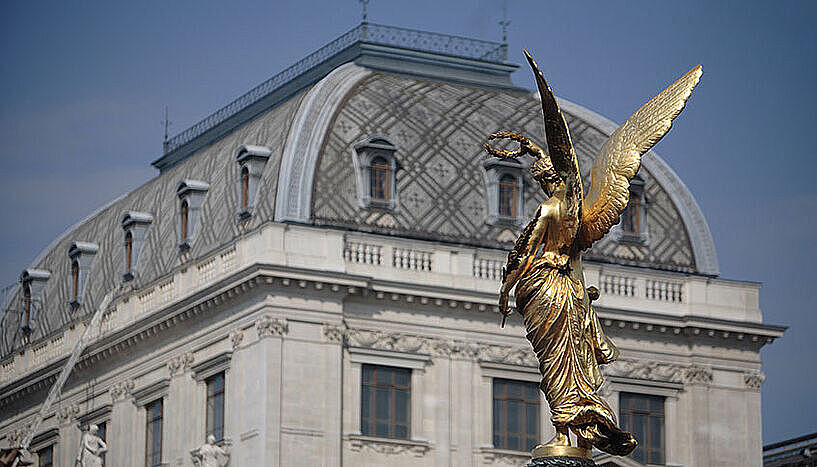Ten highly cited researchers at the University of Vienna
15. November 2022
The ten highly cited researchers at the University of Vienna conduct research at the Centre for Microbiology and Environmental Systems Science, the Faculty of Physics, the Faculty of Life Sciences, the Faculty of Computer Science, the Centre for Molecular Biology as well as in the research network in cognitive science. (© Georg Herder)
The 2022 list of most highly cited researchers worldwide contains ten academics of the University of Vienna. They conduct research at the Centre for Microbiology and Environmental Systems Science, the Faculty of Physics, the Faculty of Life Sciences, the Faculty of Computer Science, the Centre for Molecular Biology as well as in the research network in cognitive science.
Markus Aspelmeyer has been Professor of Physics at the Faculty of Physics since 2009. He examines optical precision measurements and the quantum optical control of micro- and nanomechanical systems and their application to fundamental and applied questions of quantum physics. Together with Garrett Cole, Markus Aspelmeyer founded Crystalline Mirror Solutions (CMS) – a pioneering company in the field of laser-based precision measurements. Aspelmeyer has been awarded several academic prizes, including a highly endowed ERC Synergy Grant in 2020 (more information about his research as part of the ERC Synergy Grant).
Franz Essl is associated professor at the Department of Botany and Biodiversity Research of the Faculty of Life Sciences and member of the leadership team of the Austrian biodiversity council (Biodiversitätsrat). His research focuses on the effects of global change on species and habitats. As a leading expert in the investigation of invasive alien species, he examines the impact of the spread of non-native animal and plant species on global ecosystems, also from the perspective of species extinction worldwide. (Further information about his research is available in the video “Die Menschheit steht an einem Wendepunkt”; in German).
Arndt von Haeseler has been Professor of Bioinformatics at the Centre for Molecular Biology, the Faculty of Computer Science and at the Department of Medical Biochemistry since 2010 and is Head of the Center for Integrative Bioinformatics Vienna at the Max Perutz Labs. He conducts research at the interface between mathematics and biology, in particular, on population genetics, complex evolutionary patterns, phylogenetic trees, sequence evolution and alignments.
Georg Hoffmann has been senior lecturer at the Department of Nutritional Sciences of the Faculty of Life Sciences since 2015, where he also held a temporary professorship position of Nutritional Sciences from 2012 to 2015. He is Head of the evidence-based nutritional sciences research group. His research focuses, among others, on biomarkers of overweight and obese subjects as well as on tumour diseases in connection with the metabolic syndrome.
Thomas Rattei has been Professor of In-Silico Genomics and Head of the Division of Computational Systems Biology (CUBE) at the Centre for Microbiology and Environmental Systems Science (CMESS) of the University of Vienna since 2010. His research covers a wide spectrum of topics in the field of bioinformatics, genome and metagenome analysis and systems biology. He has long-standing expertise in developing and applying computational methods for the interpretation of large-scale sequence information. (Further information about his research is available in the press release “Einheitliche Qualitätsstandards für die Virenforschung” (in German))
Andreas Richter has been Professor of Ecosystem Research at the University of Vienna since 2011. He is Head of the Centre for Microbiology and Environmental Systems Science (CMESS) at the University of Vienna and leader of the Division of Terrestrial Ecosystem Research (TER) at the Centre. His research focuses on the ecology of climate change, microbial soil ecology, plant-microbe interactions and biogeochemical cycles. He currently investigates the role of microorganisms in Arctic soil in carbon and nitrogen cycles. (Further information about his research is available in the Rudolphina article “Wenn tauende Permafrostböden Treibgase freigeben”; in German).
Michael Wagner has been Professor of Microbial Ecology at the University of Vienna since 2003. He was founding director of the Centre for Microbiology and Environmental Systems Science (CMESS) in 2019 and has been deputy head of the Centre since 2021. His key research areas include nitrification, single-cell microbiology as well as the microbiology of sponges and wastewater. Together with colleagues, he discovered the previously unknown Comammox microorganisms which play an essential role in global cycles. In 2019, Michael Wagner received the Wittgenstein Award. (Further information about his research as part of the Wittgenstein Award is available in the article “Die ‘Dunkle Materie’ der Mikroben”; in German).
Wolfgang Wanek is Professor of Physiological Ecology and Ecosystem Research at the Centre for Microbiology and Environmental Systems Science (CMESS). His research focusses on bio-geochemical cycles in plant-soil-microbe relations. He specifically focuses on the role of plants and soil microbes and their interaction in controlling ecosystem processes. In previous years, Wolfgang Wanek’s key research area was the nitrogen/phosphorus nutrition of plants and microorganisms.
Mathew P. White has been senior scientist at the Vienna Cognitive Science Hub of the University of Vienna since 2020. He is a health and environmental psychologist specialising in ecological public health, in particular the role of urban and natural environments on mental health and health-related behaviours (e.g. physical activity, smoking). In 2020, he was awarded the Delcroix Prize for oceans and human health, as well as the SHIFT Research Award.
Anton Zeilinger had been Professor of Experimental Physics at the University of Vienna since 1999, and has been Emeritus Professor at the University of Vienna since 2013. From 2013 to 2022, Zeilinger served as President of the Austrian Academy of Sciences. The list of prestigious prizes Zeilinger received is long and ranges from the Wolf Prize in Physics and the Micius Quantum Prize to the Grand Decoration of Honour in Gold for Services to the Republic of Austria. In 2022, Zeilinger received the Nobel Prize in Physics (for further information, please see the article “Nobel Prize for Anton Zeilinger and his revolutionary ‘crazy ideas’”).
